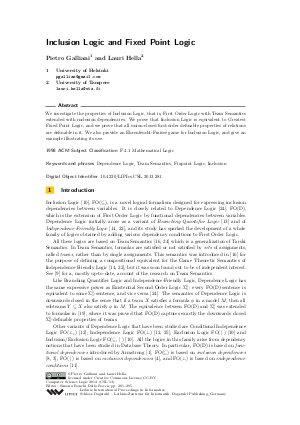Inclusion Logic and Fixed Point Logic
Authors Pietro Galliani, Lauri Hella
-
Part of:
Volume:
Computer Science Logic 2013 (CSL 2013)
Part of: Series: Leibniz International Proceedings in Informatics (LIPIcs)
Part of: Conference: Computer Science Logic (CSL) - License:
 Creative Commons Attribution 3.0 Unported license
Creative Commons Attribution 3.0 Unported license
- Publication Date: 2013-09-02
File

PDF
LIPIcs.CSL.2013.281.pdf
- Filesize: 0.53 MB
- 15 pages
Document Identifiers
Subject Classification
Keywords
- Dependence Logic
- Team Semantics
- Fixpoint Logic
- Inclusion
Metrics
- Access Statistics
-
Total Accesses (updated on a weekly basis)
0PDF Downloads0Metadata Views
Abstract
We investigate the properties of Inclusion Logic, that is, First Order Logic with Team Semantics extended with inclusion dependencies. We prove that Inclusion Logic is equivalent to Greatest Fixed Point Logic, and we prove that all union-closed first-order definable properties of relations are definable in it. We also provide an Ehrenfeucht-Fraïssé game for Inclusion Logic, and give an example illustrating its use.
Cite As Get BibTex
Pietro Galliani and Lauri Hella. Inclusion Logic and Fixed Point Logic. In Computer Science Logic 2013 (CSL 2013). Leibniz International Proceedings in Informatics (LIPIcs), Volume 23, pp. 281-295, Schloss Dagstuhl – Leibniz-Zentrum für Informatik (2013)
https://doi.org/10.4230/LIPIcs.CSL.2013.281
BibTex
@InProceedings{galliani_et_al:LIPIcs.CSL.2013.281,
author = {Galliani, Pietro and Hella, Lauri},
title = {{Inclusion Logic and Fixed Point Logic}},
booktitle = {Computer Science Logic 2013 (CSL 2013)},
pages = {281--295},
series = {Leibniz International Proceedings in Informatics (LIPIcs)},
ISBN = {978-3-939897-60-6},
ISSN = {1868-8969},
year = {2013},
volume = {23},
editor = {Ronchi Della Rocca, Simona},
publisher = {Schloss Dagstuhl -- Leibniz-Zentrum f{\"u}r Informatik},
address = {Dagstuhl, Germany},
URL = {https://drops.dagstuhl.de/entities/document/10.4230/LIPIcs.CSL.2013.281},
URN = {urn:nbn:de:0030-drops-42031},
doi = {10.4230/LIPIcs.CSL.2013.281},
annote = {Keywords: Dependence Logic, Team Semantics, Fixpoint Logic, Inclusion}
}
